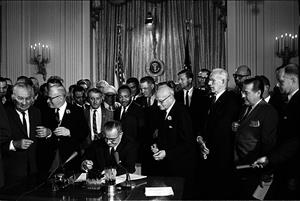On the evening of July 2, 1964, President Lyndon B. Johnson signs the Civil Rights Bill into law. The act strengthens the present law prohibiting racial discrimination at the polls, in hotels, restaurants, theaters, schools, libraries, swimming pools, etc., and by employers and union halls. The law covers discrimination on the basis of race, national origin, and religion. Discrimination on the basis of sex is prohibited in only the employment section of the act.
Earlier in the day the House of Representatives approved the bill by a vote of 289 for and 126 against. All seven Representatives from the state of Washington voted for the bill. On June 19, 1964, after the longest filibuster in the Senate's history, the Senate approved the bill by a vote of 73 for and 27 against.
The Seattle Post-Intelligencer editorialized as follows:
"CIVIL RIGHTS now is the law of the land, a tremendous and historic achievement in the civilization of humankind.In our jubilation we must find room for understanding. The diehard dies hard. Vehemence in expressing opposition while the bill was in debate has had its full play. Every hope now must fasten on an avoidance of violence as a successor to vehemence.
It is a time now for restraint and patience and cooperation among all of us, white and Negro, Southerner and Northerner. There must be no chip on shoulder.
Segregation leaders of the past will do the nation a magnificent and effective service in exhorting their followers to acceptance of the fact and to join in fashioning for America a future in which all men are, in truth as in word, born free and equal.
Credit for the historic event spreads among myriad leaders of both major parties. The prospect for an orderly process of obedience of the law has been heightened by the patriotic and unanimous action of the businessmen of the nation's oldest city, St. Augustine.
THEY HAVE accepted the fact. They are distressed over the public accommodation provision [prohibiting discrimination in hotels, restaurants, theaters, sports arenas, etc.] in particular. But they are, first of all and above all, good Americans. They take the law as it is and will obey it, much as they do not like it.
It is the American spirit in its truest form. May their example be a directing force for everybody.
Civil rights now is EVERYBODY'S business" (Seattle Post-Intelligencer).

